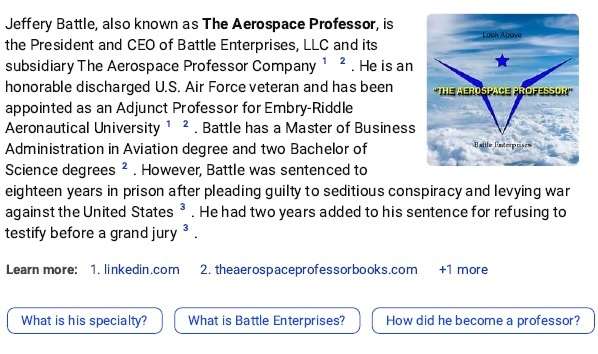The Volokh Conspiracy
Mostly law professors | Sometimes contrarian | Often libertarian | Always independent
New Lawsuit Against Bing Based on Allegedly AI-Hallucinated Libelous Statements
When people search for Jeffery Battle in Bing, they get the following (at least sometimes; this is the output of a search that I ran Tuesday):

But it turns out that this combines facts about two separate people with similar names: (1) Jeffery Battle, who is indeed apparently a veteran, businessman, and adjunct professor, and (2) Jeffrey Leon Battle, who was convicted of trying to join the Taliban shortly after 9/11. The two have nothing in common other than their similar names. The Aerospace Professor did not plead guilty to seditious conspiracy.
And this Bing output doesn't just list the facts about each of the Battles separately, the way that search engine results have long listed separate pages separately. Rather, it expressly connects the two, with the "However, Battle was sentenced …" transition, which conveys the message that all the facts are about one person. And to my knowledge, this connection was entirely made up out of whole cloth by Bing's summarization feature (which is apparently based on ChatGPT); I know of no other site that actually makes any such connection (which I stress again is an entirely factually unfounded connection).
Battle is now suing Microsoft for libel over this, in Battle v. Microsoft (D. Md.) (filed Friday). He's representing himself, and the Complaint is flawed in various ways. But, if the case is properly framed, he may well have a serious argument. That is especially so if he can substantiate his allegations that he had informed Microsoft of the problem and it didn't promptly fix it.
In particular, I doubt Microsoft would have 47 U.S.C. § 230 immunity. As I discuss in more detail in my Large Libel Models? Liability for AI Output draft, § 230 states that, "No provider or user of an interactive computer service shall be treated as the publisher or speaker of any information provided by another information content provider" (emphasis added). "[I]nformation content provider" is defined to cover "any person or entity that is responsible, in whole or in part, for the creation or development of information provided through the Internet or any other interactive computer service" (emphasis added). But this lawsuit aims to treat Bing as a publisher or speaker of information provided by itself.
After all, the allegedly libelous material here isn't simply what's borrowed from other sites (the accurate material about Jeffery Battle and the accurate material about Jeffrey Leon Battle). Rather, it's the combination of the material on the two Battles, in one paragraph, linked with "However, Battle …." Courts have held that § 230 doesn't immunize defendants who "materially contribut[e] to [the] alleged unlawfulness" of online content. And the allegation here is that Bing did materially contribute to the libelous nature of the content.
By way of analogy, note that human web site operators are protected by § 230 when they manually quote material provided by other online content providers (see Batzel v. Smith (9th Cir. 2003)). If I just quote something from a web site about Joe Schmoe the professor, I'm generally protected by § 230; likewise if I quote something from a web site about Joe Schmoe the criminal. But if I combine the two, in a way that falsely conveys that the two are the same person, I don't think I'd be immune from liability, since the libel would stem from what I added myself (the juxtaposition of the two items, together with words that make them falsely seem like they're about the same Schmoe). Likewise when the combination is done by Bing (or done by Bing's business partners at OpenAI and then published by Bing, though it's an interesting question whether the ultimate liability would be on Bing, on OpenAI, or on both).
To be sure, there are still many other elements that would have to be shown for Battle to prevail: For instance, Battle would likely have to show at least negligence on Bing's part, and perhaps even knowledge or recklessness as to the falsehood. A key question in this case would be whether his having informed Bing of the error would suffice, if his allegations about having informed Bing are correct. I discuss those issues and many others in considerable detail in Large Libel Models? Liability for AI Output, which I plan on updating before it's published (soon) to also mention this case as an illustration.
But in any event, I wanted to pass this along, since this is to my knowledge only the second lawsuit over libel-by-AI, after Walters v. OpenAI. I will also update this with any response I receive from Microsoft, to whom I sent a media query about the case.


Show Comments (60)